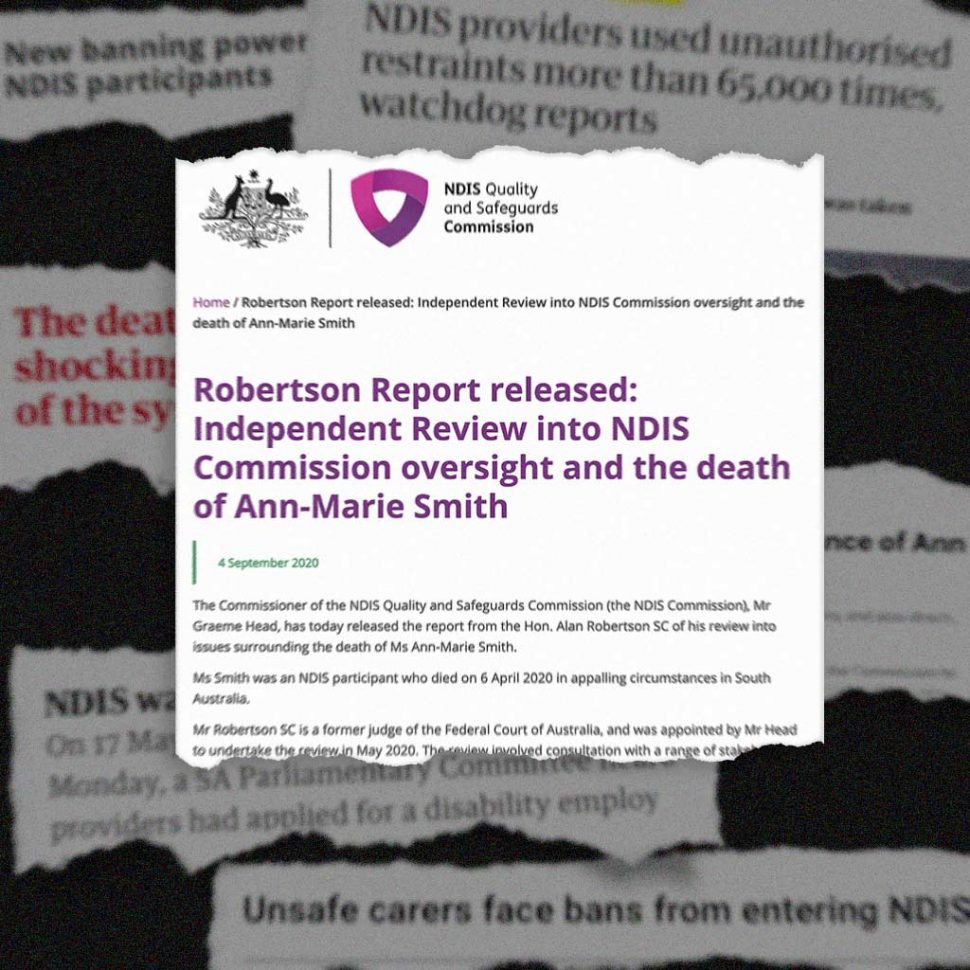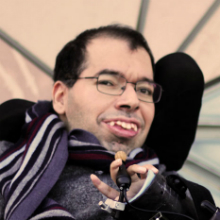Choice and control, advocacy and relationships – keys to addressing abuse and neglect

The government also appointed a former judge to carry out an investigation into circumstances surrounding her death – and whether more action should have been taken against the organisation which was supposed to providing her with support.
In particular whether the NDIS Quality and Safeguards Commission should have done more.
Dr George Taleporos has had a good long look at the final report – and shares with us where he thinks it fell short. And what he thinks should happen next.
On 31 August the NDIS Quality and Safeguards Commissioner received a list of recommendations from the independent review into the death of Ms Ann Marie Smith.
The review was not about who was responsible for her death. That’s now a police matter. The review looked instead at whether the regulation of Ms Smith’s service provider was adequate. The review also looked at the systems and processes of the NDIS Quality and Safeguards Commission – and whether they could have, or should have, done more.
And even though the terms of reference for the review were quite specific, the Hon Alan Robertson SC took the opportunity to make recommendations for change well beyond the work of the Commission.
Like most reports of its kind, the recommendations were listed in order of importance. The first two recommendations were:
(1) The Commission should act to identify earlier those people with disability who are vulnerable to harm or neglect. Every stage of decision-making, including corrective regulation, should be alive to factors indicating that a participant may be vulnerable to harm or neglect.
(2) No vulnerable NDIS participant should have a sole carer providing services in the participant’s own home. The relevant statutory instruments and guidelines should be amended to provide expressly for this.
These recommendations are entirely logical, drawn clearly from the evidence that was brought to the inquiry.
Essentially, if Ms Smith had other support workers visiting her, alarms would have been raised and the horrific neglect and abuse would have been prevented.
I know from personal experience that having more than one support worker is an important safeguard. It is something that I would strongly recommend to anyone who relies on others for essential personal care. It is vital to have another set of eyes and another pair of hands. In fact, for people with high support needs like my own, I recommend half a dozen workers on a support team for things to run smoothly.
Despite this, I do not fully support these recommendations. They are problematic on a number of levels.
Firstly, what happens when an NDIS participant only wants one worker? Forcing an NDIS participant to have more than one support worker is against the fundamental NDIS principle of choice and control.
People may only want one worker for legitimate cultural or health reasons. The coronavirus has reminded all of us about the need to reduce the number of personal contacts that we have. This is particularly true when those contacts provide close personal support and where physical distancing is not an option.
There is also the issue of the lack of availability of workers in regional and rural areas.
There may be a range of other reasons. But the reasons themselves are less important than the principle of having the right to decide who comes into your home and who provides your personal care.
The second problem with this recommendation is that we are labelling disabled people as vulnerable. The reasons why this is problematic were spelt out by disability and domestic violence advocate Nicole Lee. Essentially Nicole reminds us that using the term “vulnerable” blames an individual’s disability when we experience violence and neglect.
Labelling us as vulnerable disempowers us. Our “vulnerability” is too often used to justify taking away our rights to make choices for ourselves.
We need to be very cautious when regulations are recommended in the interests of “protecting the vulnerable”.
Thirdly, how and who decides who is vulnerable? What if a disabled person doesn’t want that label? Will the rules for “the vulnerable” be forced upon them?
As we enter the second year of the Disability Royal Commission, and as more cases of abuse, violence, neglect and exploitation emerge, policy recommendations to “protect the vulnerable” will sound necessary. Even appropriate at first glance.
When considering these recommendations, we need to remember that policy responses must uphold the rights that people with disabilities have worked hard to have recognised in the NDIS. The right to choice and control over our lives, the right to make decisions for ourselves.
Policy responses should avoid categorising disabled people as “vulnerable”. Doing so threatens our autonomy and freedom to choose how we live our lives.
Policy responses should be focused on building the capacity of people with disabilities to be empowered, autonomous and in charge of how we live and how we are supported.
At the same time, providers need to be held accountable for the services that they are paid to provide. We need to see serious penalties for breaches of duty of care. The $13,000 fine handed to Ann Marie Smith’s provider, for example, was grossly inadequate.
We need real time, objective measures of provider performance, and less reliance on provider self-reports. We also need a nationwide community visitor scheme.
But more than that, we need much more focus on developmental safeguards. These are all the things around us that protect us from harm. Things like our family and friends, our ability to sense when something isn’t right and to know what to do to speak up and protect ourselves.
This can be hard for some people. And there is not enough investment in self advocacy groups in Australia.
Many of us are lonely, socially isolated and have very few friends. For many people with disabilities, the only people in our lives are those who are paid to be there.
I urge the Disability Royal Commission to focus in on how we can build developmental safeguards and how we can address the serious social isolation that many of us experience.
Social connectedness and the ability to speak up for oneself is the most important safeguard against abuse and neglect. It is tragic that it has taken with the death of Ann-Marie Smith to make this abundantly clear.
Want to read more?
You can find a copy of the full report by Hon Alan Robertson on the NDIS Quality and Safeguards Commission website.
Every Australian Counts made a submission to the Joint Standing Committee’s inquiry into the NDIS Quality and Safeguards Commission. You can read the submission or read about what we told the Committee when we gave evidence.


Join the conversation